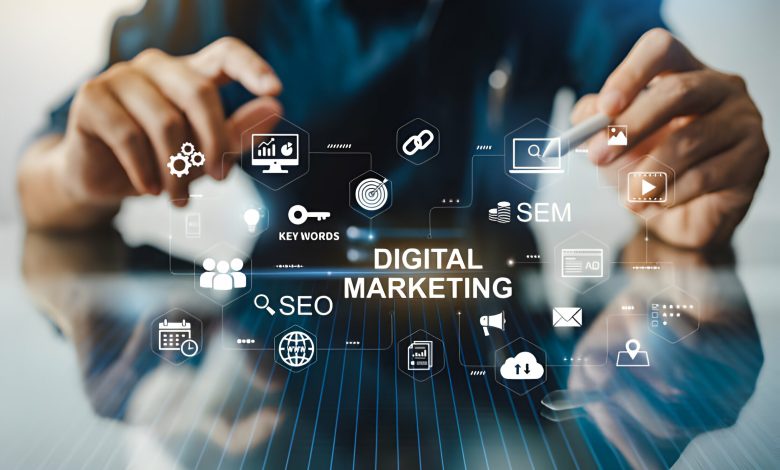
In today’s advanced era, the Internet has become the heartbeat of business operations. It’s where connections are made, audiences are reached, and success is defined.
Welcome to the realm of digital marketing, a transformative revolution that continuously reshapes the marketing landscape with each passing season.
In this comprehensive blog post, we will embark on a journey through the fundamentals of digital marketing, unveiling its core principles and endless possibilities.
Whether you’re a seasoned professional looking to sharpen your skills or a newcomer eager to explore the ever-evolving world of online promotion, this article published by Kokose will serve as your guiding light.
So, without further delay, let’s dive headfirst into the essence of digital marketing and discover the boundless opportunities it presents.
What is digital marketing?
Digital marketing is the practice of leveraging digital channels and technologies to promote products, services, or brands to a wide online audience.
It encompasses a diverse range of strategies and tactics aimed at reaching, engaging, and influencing potential customers through digital devices and platforms.
Defining Digital Marketing
At its core, digital marketing is about connecting businesses with their target audience in the online world.
This form of marketing employs various channels, including websites, mobile devices, social media, search engines, email, and more, to convey messages, build relationships, and drive desired actions.
With all that said, if you’re still confused and need more explanations about Digital Marketing, you can watch the video down below for more explanations. Trust me this way will explain even better.
Historical Evolution of Digital Marketing
The roots of digital marketing trace back to the early days of the Internet in the 1990s.
During this era, email marketing emerged as one of the first strategies, allowing businesses to communicate directly with their customers via email. As the internet continued to evolve, so did digital marketing.
One significant milestone was the advent of search engines like Google, which gave rise to search engine optimization (SEO) as a crucial strategy for improving website visibility.
Alongside SEO, pay-per-click (PPC) advertising gained prominence, enabling businesses to bid for ad placements on search engine results pages.
The explosion of social media platforms in the 2000s further transformed digital marketing. Companies began using platforms like Facebook, Twitter, and LinkedIn to engage with their audience, share content, and advertise products and services.
Fast forward to the present day, and digital marketing has become an intricate landscape with numerous channels and techniques, all designed to help businesses thrive in the digital age.
Principles of Digital Marketing
Digital marketing is built upon several fundamental principles:
- Audience-Centric Approach: The foundation of successful digital marketing is a deep understanding of your target audience. Knowing their needs, preferences, and behaviors allows you to tailor your strategies to resonate with them.
- Multi-Channel Engagement: Effective digital marketing often requires a multi-channel approach. Different audiences may prefer different platforms, so diversifying your efforts across various channels can maximize your reach.
- Data-Driven Decision-Making: Data is the lifeblood of digital marketing. Marketers rely on real-time analytics to measure campaign success, make informed decisions, and continuously optimize strategies for better results.
- Content Quality: Content lies at the heart of digital marketing. High-quality, relevant, and engaging content is essential for attracting and retaining the attention of your audience.
- Personalization: Personalized experiences, driven by data and user behavior analysis, can significantly enhance customer engagement and conversion rates.
- Adaptability: The digital landscape is constantly evolving. Staying agile and adapting to new technologies and trends is key to maintaining a competitive edge.
Understanding these principles is essential for crafting effective strategies that resonate with your target audience and drive your business forward.
In the following sections, we will delve deeper into the various components and strategies within digital marketing, providing you with a comprehensive guide to navigating this dynamic field.
The Significance of Digital Marketing
In today’s fast-paced and digitally driven world, the significance of digital marketing cannot be overstated.
It has evolved into a cornerstone of modern business strategies, offering a plethora of advantages that can make or break a company’s success.
Why Digital Marketing Is Crucial in the Modern Business Landscape
- Reaching a Global Audience: It breaks down geographical barriers, allowing businesses to connect with a global audience. Whether your target customers are across town or on the other side of the world, digital marketing can help you reach them.
- Real-Time Analytics and Data-Driven Decisions: Unlike traditional marketing methods, it provides real-time data and analytics. This wealth of information allows businesses to make informed decisions, track the performance of their campaigns, and make the necessary adjustments.
- Cost-Effectiveness Compared to traditional marketing: Digital marketing offers cost-effective solutions for businesses of all sizes. With targeted advertising and efficient use of resources, you can achieve more significant results with smaller budgets compared to traditional marketing channels.
- Building Brand Loyalty and Trust: Through personalized communication and engaging content, It helps businesses build lasting relationships with their customers. It fosters brand loyalty and trust, turning one-time buyers into repeat customers and brand advocates.
- Increasing Return on Investment (ROI): The ability to track and measure the effectiveness of digital marketing campaigns ensures that you get the most out of your marketing budget. This results-driven approach often leads to a higher return on investment (ROI) compared to traditional advertising methods.
Core Strategies and Techniques in Digital Marketing
- Search Engine Optimization (SEO): SEO is the process of optimizing your website to rank higher in search engine results pages (SERPs). By improving your website’s visibility, you can attract organic traffic and potential customers actively searching for products or services like yours.
- Pay-Per-Click (PPC) Advertising: PPC advertising involves bidding on keywords to display ads in search engine results. It’s a quick way to gain visibility and drive traffic to your website, with the flexibility to control your budget.
- Social Media Marketing: Leveraging social media platforms like Facebook, Twitter, Instagram, and LinkedIn allows businesses to connect with their audience, share content, and run targeted ad campaigns. Social media offers a direct line of communication with customers and provides insights into their preferences.
- Content Creation: It’s about producing high-quality, relevant, and valuable content to attract and engage your target audience. It includes blog posts, articles, videos, infographics, and more.
- Email marketing: remains an effective strategy for reaching your audience directly. It involves sending targeted messages to subscribers’ inboxes, fostering customer relationships, and driving sales.
These core strategies and techniques serve as the building blocks of digital marketing. By understanding and effectively implementing them, businesses can thrive in the competitive digital landscape.
In the following sections, we will explore each of these strategies in greater detail, providing you with actionable insights to enhance your digital marketing efforts.
Importance and Benefits of Digital Marketing
In this technological world, digital marketing is very important for businesses to thrive. It enables businesses to reach a vast audience, cultivate personalized relationships, and utilize real-time data to track campaign performance.
The benefits are extensive, including increased brand visibility, more engaged customers, reduced costs, and a higher return on investment (ROI).
Exploring the Importance of Digital Marketing
In the contemporary business landscape, digital marketing is not merely an option but a necessity. Several factors underscore its profound importance:
- Wide Audience Reach: With over 4.8 billion internet users worldwide, digital marketing provides a global platform to connect with potential customers. It ensures that your message can reach a massive and diverse audience.
- Personalized Engagement: It allows businesses to create highly personalized marketing campaigns. By tailoring content and messaging to specific audience segments, you can engage customers on a more personal level, increasing the chances of conversion.
- Real-Time Adaptation: One of its most significant advantages is its ability to adapt in real time. Unlike traditional strategies, digital strategies can be adjusted instantly based on data and insights, ensuring that your campaigns stay relevant and effective.
Benefits of Implementing Digital Marketing Strategies
The benefits of embracing digital marketing strategies are both substantial and measurable.
- Increased Brand Awareness: Digital marketing efforts, such as social media advertising and content marketing, can significantly enhance brand visibility. When people encounter your brand online frequently, they are more likely to recognize and trust it.
- Engaged Customers: Engaging content, personalized messaging, and interactive campaigns foster a strong connection between your brand and customers. Engaged customers are more likely to remain loyal and advocate for your brand.
- Cost Efficiency: Compared to traditional channels, digital marketing offers a cost-effective way to reach your target audience. Pay-per-click advertising, for example, ensures that you only pay when someone interacts with your ad.
- Better ROI: With the ability to track and measure the performance of digital campaigns, you can assess their effectiveness in real time. This data-driven approach allows you to optimize strategies for a higher return on investment.
Real-time Data and Its Role in Digital Marketing Success
Real-time data is the backbone of successful digital marketing campaigns. It serves several crucial functions:
- Performance Tracking: Real-time data analytics enable you to monitor the performance of your campaigns as they unfold. You can see which strategies are working and which need adjustments, allowing for rapid optimization.
- Customer Insights: By analyzing real-time data, you gain valuable insights into customer behavior and preferences. This information helps you refine your strategies and deliver more relevant content to your audience.
- Adaptation: Its agility relies on real-time data. When you spot trends or changing customer needs, you can quickly adapt your campaigns to stay aligned with your audience’s expectations.
In summary, the importance of digital marketing in today’s business landscape cannot be overstated.
It offers a powerful means to reach a vast audience, build personalized connections, and maximize your ROI. Furthermore, real-time data empowers you to fine-tune your strategies for optimal performance.
As we delve deeper into the world of digital marketing in the following sections, you’ll discover the various strategies and tactics at your disposal to harness its full potential.
Types Of Digital Marketing
In the realm of digital marketing, numerous strategies and tactics exist to help businesses connect with their target audience and achieve their marketing goals. Let’s explore these strategies, starting with:
1. Search engine optimization (SEO)
Some of the things that search engines like Google and Bing look at to decide how relevant a website is are its links, content, keywords, and user activity.
When you optimize a page and its content for SEO, you get more good web traffic, and you usually don’t have to pay for it.
SEO is like a superhero for digital marketing; it makes a business noticeable on the web by putting it high in search engine results, which makes it easier for people who might want to buy from you to find it.
It includes making your website more trustworthy and easy for people to use, which leads to better content, faster load times, and mobile friendliness.
SEO skills can make the difference between being unknown and well-known online, so businesses need to learn them if they want to stay current and noticeable online.
2. Search engine marketing (SEM)
Search Engine Marketing (SEM), which is also called paid search or PPC advertising, is a type of digital marketing that aims to make a website more visible in search results.
Companies and businesses bid on keywords that are related to their goods or services so that their websites show up high when people look for those terms.
Search engine marketing (SEM) is a strong way to get focused visitors, raise awareness of your business, and make sales.
Its accuracy lets companies reach possible customers who are actively looking for what they have to offer.
SEO (search engine optimization) is an important part of any digital marketing strategy, whether you’re a new business trying to get noticed or an established one wanting to improve your online profile.
To figure out how to use SEM to its fullest to take your business to new heights, I would recommend you watch the video down below to the end; it will help.
3. Email Marketing
Email marketing is a popular digital marketing strategy that drives engagement by sending targeted messages directly to subscribers or consumer’s inboxes.
With 99% of people around the world checking their emails daily, it’s a powerful tool for building customer relationships, driving sales, and boosting ROI.
Email marketing is versatile, trackable, and offers data-driven decision-making, making it an essential component of any comprehensive digital marketing strategy. It’s like having a one-on-one conversation with customers.
4. Social Media Marketing
Social media marketing is a crucial tool for businesses to connect with their target audience and expand their reach.
It involves leveraging platforms like Facebook, Instagram, Twitter, and LinkedIn to engage with customers through compelling content, interactive campaigns, and targeted advertising.
With real-time feedback, businesses can adapt their marketing approach to stay relevant and thrive in the digital landscape.
5. Affiliate Marketing
Affiliate marketing, a popular digital strategy, involves promoting other people’s products or services. Affiliates earn commissions for driving traffic or sales, benefiting both parties.
This collaborative approach expands businesses’ reach and increases sales while providing affiliates with a share of the profits. Thriving on digital platforms and social media, it’s a cost-effective way to boost brand visibility and drive conversions.
Understanding affiliate marketing can unlock opportunities for aspiring marketers and businesses looking to expand their reach in the digital landscape
6. Content Marketing
Content marketing is a crucial aspect of digital marketing, focusing on creating high-quality, entertaining, and informative content.
This can be done through various mediums, such as blog posts, social media posts, infographics, videos, podcasts, ads, and webpages.
Content marketing is about strategy, planning, creativity, and analysis, aiming to build trust and position a brand as an authority in its field. It connects with potential customers, educates them, and drives informed purchasing decisions.
Content marketing strengthens brand identity, boosts SEO, and connects businesses with their audience, ultimately leading to increased brand loyalty and conversions.
7. Video Marketing
Video marketing is a digital dynamo that has taken the marketing world by storm. In an era where attention spans are shrinking, videos captivate and convey messages with remarkable efficiency.
Whether it’s a snappy promotional clip, an engaging tutorial, or a compelling brand story, videos have the power to engage and connect with audiences on a deep emotional level. They are shareable, memorable, and highly persuasive.
With platforms like YouTube, TikTok, and Instagram Reels at the forefront, video marketing offers businesses an unprecedented opportunity to showcase their products or services, entertain, educate, and ultimately drive meaningful engagement and conversions.
So, if you’re not harnessing the magic of video in your strategy, you might be missing out on one of the most influential tools in today’s marketing landscape.
8. Online ads Marketing
Online ads marketing, also known as pay-per-click (PPC) advertising, is a powerful aspect of digital marketing that allows businesses to reach their target audience with precision.
By strategically placing ads on search engines, social media platforms, and websites, businesses can engage potential customers, drive website traffic, and boost sales.
With the ability to customize campaigns, track performance in real time, and optimize strategies for maximum impact, online ad marketing is a game-changer in the digital landscape.
It offers a direct and measurable way to drive traffic, generate leads, and boost conversions, making it an indispensable tool for businesses aiming to maximize their online presence and ROI.
9. Influencer Marketing
In today’s advanced landscape, influencer marketing emerges as a dynamic and impactful strategy. It involves collaborating with individuals who wield significant influence and a dedicated following in specific niches.
These influencers have the power to authentically endorse products or services to their engaged audience, often resulting in increased brand credibility and exposure.
Influencer marketing is more than just a trend; it’s a proven way to connect with consumers on a personal level, tapping into the trust they place in their favorite influencers.
To explore this strategy in-depth and gain valuable insights, watch the video below. It’s a fascinating journey into the world of influencer marketing and how it can elevate your brand’s digital presence.
10. Mobile Marketing
The growing number of smartphone users around the world has changed marketing by opening up a lot of new ways to reach potential buyers.
Mobile marketing is an important part of digital marketing. To reach people, it uses different ways such as SMS, MMS, and mobile app marketing.
This approach takes advantage of how easy and convenient mobile platforms are to offer personalized content and ads that build brand trust and increase sales.
Please watch the video below to fully understand the ins and outs of mobile marketing and stay on top of the latest trends in the field. You can learn more about this dynamic marketing method and get the most out of it by using this helpful resource.
Conclusion
In the dynamic landscape of today’s advanced era, understanding the essence of digital marketing is not merely an option. it’s imperative for businesses aiming to thrive and grow.
As we’ve traversed through the core principles, historical evolution, and diverse strategies of digital marketing, you’ve gained insights into the transformative power it wields.
Digital marketing is the conduit through which businesses connect with their audiences in the vast online realm, cultivating personalized relationships and reaping the rewards of real-time data-driven decision-making.
Whether you’re a seasoned marketer looking to refine your skills or a newcomer embarking on a journey of discovery, this comprehensive guide has illuminated the multifaceted world of digital marketing.
From search engine optimization (SEO) to influencer marketing, each strategy offers a unique opportunity to engage, captivate, and convert potential customers.
As you embark on your journey, remember that adaptability and a deep understanding of your audience are your compass.
Keep a watchful eye on emerging trends and technologies, and harness the power of data to continually optimize your strategies.
The digital marketing landscape is ever-evolving, offering endless possibilities for those willing to innovate and engage.
What Lies Ahead
Beyond this exploration of digital marketing, there’s a world of insights, tools, and strategies waiting to be uncovered.
Dive deeper into the nuances of each digital marketing strategy, explore success stories, and gain practical tips to elevate you in the game.
We invite you to navigate our blog and resources to stay at the forefront of the digital marketing revolution.
Thank you for joining us on this enlightening journey through the realm of digital marketing. Embrace the opportunities that lie ahead, and may your digital endeavors be filled with success and growth.




